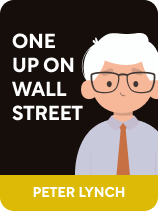

This article is an excerpt from the Shortform book guide to "One Up On Wall Street" by Peter Lynch. Shortform has the world's best summaries and analyses of books you should be reading.
Like this article? Sign up for a free trial here.
Have you always wanted to invest in the stock market but felt too uninformed or inexperienced to do so? Do you really need financial expertise to be a successful investor?
According to Peter Lynch, investing is not as complicated as it is made out to be. Everyone not only has all the tools they need to become a savvy investor, but they actually have a better chance of investing successfully than professionals and firms.
Here’s why you have a better chance of success investing independently.
Reasons to Invest on Your Own
According to Peter Lynch, investing is not as hard as financial advisors make it seem. Lynch insists that you already have everything you need to do well in the stock market and that you don’t need the services or guidance of a professional investor. He believes this is the case because:
- Professional investors and firms aren’t flawless.
- You’re usually a better source of knowledge than professional investors.
(Shortform note: Others agree with Lynch that you don’t need the guidance of a professional when investing. In The Simple Path to Wealth, J.L. Collins even asserts that firms make investing seem complex to convince potential clients they need a firm’s expertise.)
Professional Investors and Firms Aren’t Flawless
Lynch argues that professional investors can lead you astray because they’re often misguided or operating from high-minded theories, rather than on-the-ground experience.
(Shortform note: What exactly is a professional investor? The term can apply to day traders, people who trade stocks in their portfolios as a career and chief source of income. However, the term more commonly applies to financial advisors who advise a set of clients and help them develop a better portfolio.)
In part, this is because professional investors face the following obstacles, according to Lynch:
Delays: Most professional investors only buy stock once other investors or firms have done so, and it’s therefore a proven good investment. This means they’re not free to leap on early opportunities, when the stock price is low.
Reputation management: Professional investors have a greater incentive to stick to safe, established companies because they risk less professionally. Investment firms also often like to prioritize parity over profit, spreading investment success somewhat equally among clients so clients don’t become upset if others’ portfolios do better than theirs. The result is that when you allow an investment firm to make investing decisions for you, you’ll likely only ever make moderate gains.
Restrictions on what they can buy: Many investment firms don’t invest in companies that have unions, operate in certain industries, or follow other relatively arbitrary rules. Further, the SEC imposes restrictions on what firms can buy. This limits the range of companies they’ll invest in for your benefit.
You’re Usually a Better Source of Knowledge Than Professional Investors
When you invest yourself, you have the advantage of being a consumer who can learn about and test a company’s products or services on a daily basis, either in your personal life or at work. This gives you first-hand knowledge of a company’s output.
(Shortform note: As a consumer of a product or service, you may even have an additional advantage: Your consumer feedback, if incorporated, can actively improve a product and thereby improve a company’s prospects on the stock market.)
You’re also an independent entity who can make your own choices on your own timeline, continues Lynch. This lets you potentially make more money on small yet promising companies you come across long before investment firms learn about and act on them.
(Shortform note: While as an independent investor, you have the advantage of being able to make your own choices, many investors enter the stock market precisely because they’re not fully independent: They have children whose college educations they must pay. Therefore, while invested parents may like to leap on small, promising opportunities they come across in daily life, they may also feel pressure to follow the herd, thinking this route is less risky.)

———End of Preview———
Like what you just read? Read the rest of the world's best book summary and analysis of Peter Lynch's "One Up On Wall Street" at Shortform.
Here's what you'll find in our full One Up On Wall Street summary:
- Why individuals fare better in the stock market than professionals and firms
- A no-nonsense approach to the stock market
- Why you shouldn't follow the complex predictions of so-called professionals






